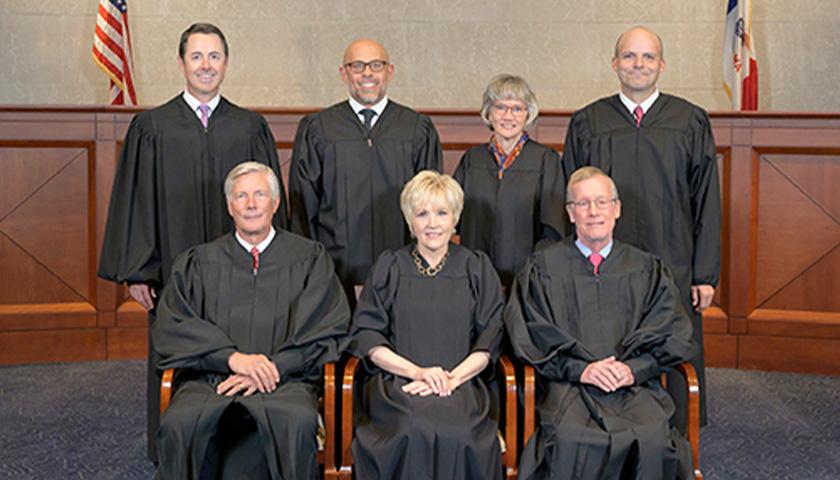In a rare split decision, the Iowa Supreme Court on Friday balked at reinstating Iowa’s “fetal heartbeat bill,” a move that keeps abortion through 20 weeks of pregnancy unfettered in the Hawkeye State, for now.
The advisory ruling, rendered despite the fact that the U.S. Supreme Court overturned federal constitutional abortion protections a year ago, was blasted by Republicans and pro-life groups and hailed by Democrats and their abortion industry allies.
“To say that today’s lack of action by the Iowa Supreme Court is a disappointment is an understatement,” Republican Governor Kim Reynolds said in a statement. “Not only does it disregard Iowa voters who elected representatives willing to stand up for the rights of unborn children, but it has sided with a single judge in a single county who struck down Iowa’s legislation based on principles that now have been flat-out rejected by the U.S. Supreme Court.”
Iowa’s high court’s evenly divided ruling by default affirms a lower court’s 2019 order that maintained access to abortion through 20 weeks of a pregnancy. That ruling overturned the heartbeat bill that outlawed abortion at the point an unborn child’s heartbeat is detected — typically around six weeks.
The 3-3 stalemate kept the district’s decision in place.
Iowa Supreme Court Justice Thomas Waterman, in the prevailing ruling, noted that the state Supreme Court did not want to insert itself into the legislative branch’s business.
“In our view it is legislating from the bench to take a statute that was moribund when it was enacted and has been enjoined for four years and then to put it in effect,” Waterman wrote for the three justices who sided with the lower court.
The divided decision is being viewed as a political loss for Reynolds, who appointed five of the seven justices to the bench. But the setback may be temporary. As Waterman asserts, the heartbeat bill, ruled dead on arrival in the district court, could stand judicial scrutiny once the Republican-controlled legislature passes and Reynolds signs a new law — in a post-Roe v. Wade Iowa.
Waterman appears to be making an originalist argument, asserting the Constitution’s separation of powers.
“The State … now asks our court to do something that has never happened in Iowa history: to simultaneously bypass the legislature and change the law… and then to dissolve an injunction to put a statute into effect for the first time in the same case in which that very enactment was declared unconstitutional years earlier,” the justice wrote.
“The fight is not over,” the governor told the Des Moines Register. “There is no right more sacred than life, and nothing more worthy of our strongest defense than the innocent unborn. We are reviewing our options in preparation for continuing the fight.”
Justice Dana Oxley recused herself from the case, setting up the evenly divided decision. Oxley, a recent Reynolds’ appointee, did not state why she opted out, but she did join a 2022 majority opinion in which Iowa Supreme Court justices ruled the Iowa constitution doesn’t guarantee the right to an abortion in the wake of the U.S. Supreme Court’s Dobbs decision overturning Roe v. Wade. Interestingly, Oxley previously served as an attorney with Shuttleworth & Ingersoll, a Cedar Rapids law firm that has represented the feminist, abortion-rights Emma Goldman Clinic in Iowa City in the case.
Court Chief Justice Susan Christensen and Justices Edward Mansfield joined Waterman in effectively affirming the district court decision, while Justices Christopher McDonald, Matthew McDermott and David May sought to reverse it.
Writing for the opposition, McDonald argues that when a case “adjudging a statute unconstitutional is overruled, the statute becomes operative without reenactment.”
“This has been ‘well settled’ law in the state for more than a century,” he wrote in a stern rebuke of the opposing justices. “There is no ‘legal uncertainty’ under Iowa law; there is only my colleagues’ refusal to apply ‘well settled’ Iowa law.”
Abortion advocates celebrated the court’s deadlock and the preservation of abortion in Iowa through 20 weeks – or five months.
“The Iowa Supreme Court just preserved abortion access in Iowa by blocking a near-total abortion ban from taking effect. This is a resounding victory for Iowans and reproductive freedom,” Planned Parenthood Advocates of Iowa tweeted.
🌟 MAJOR WIN ALERT 🌟
The Iowa Supreme Court just preserved abortion access in Iowa by blocking a near-total abortion ban from taking effect. This is a resounding victory for Iowans and reproductive freedom. #BansOffOurBodies pic.twitter.com/0d3KRUErL0
— Planned Parenthood Advocates of Iowa (@ppadvocatesia) June 16, 2023
Iowa Right to Life registered its disappointment by simply stating the facts on its Twitter account.
“Unfortunately, the split court decision means #abortion remains legal in Iowa through 20 weeks of pregnancy and the so-called fetal heartbeat law will not take effect,” the nonprofit wrote following the ruling.
Unfortunately, the split court decision means #abortion remains legal in Iowa through 20 weeks of pregnancy and the so-called fetal heartbeat law will not take effect. 😡 https://t.co/IL7pQefzob
— Iowa Right to Life (@IowaRTL) June 16, 2023
According to Axios, 20 states prohibited or restricted abortion as of the end of April.
– – –
M.D. Kittle is the National Political Editor for The Star News Network.
Photo “Iowa Supreme Court Justices” by Iowa Supreme Court.








